Learning the Art of Electronics
The name of this project relates to a book called Learning The Art of Electronics: A Hands-On Lab Course. It's a university-level lab course developed and delivered at Stanford University. I am working through the coursework and recording videos of my progress as I do the lab exercises. I am also taking notes from the books referenced in the coursework and making those notes available on this wiki as a perk for my Patreon supporters.
I aim to release one video every Tuesday on my YouTube channel @InTheLabWithJayJay in the Learning the Art of Electronics playlist. For each lab exercise in the book I record a number of videos covering it. This isn't the only project I'm working on and you will find other electronics related material on my YouTube channel. The YouTube channel has its own website (which also hosts this wiki): www.InTheLabWithJayJay.com
We started in April 2025, and it will take us many years to complete the content. In the meantime these notes are a work-in-progress. See the rest of this page for information about the books we reference and the lab exercises we have done or will do soon enough. If you're following along with this project the monthly pre-reading is given in the labs section below.
If you're interested in this project you can follow on YouTube. If you're enjoying this material or would like access to the subscriber-only content you can sponsor development with a small monthly contribution: patreon.com/JohnElliotV
Links
Here are a few links which may come in handy:
| Facility | Link | Note |
|---|---|---|
| Project page | Learning the Art of Electronics | this page, which is your point of access for everything else |
| Show website | www.InTheLabWithJayJay.com | the website for my video blog |
| YouTube channel | @InTheLabWithJayJay | my main YouTube channel on which these videos are released |
| YouTube playlist | Learning the Art of Electronics | the playlist to which these videos are added |
Book notes
Here are the links to my book notes. Book notes are subscriber-only content. If you want book details see books below.
| Book Notes (subscriber-only content) | Math Level | Book Details |
|---|---|---|
| Learning the Art of Electronics 2ed | hardly any | details |
| The Art of Electronics 3ed | low to moderate | details |
| The Art of Electronics: The x Chapters | low to moderate | details |
| Principles of Electronic Circuits 2ed | heaps | details |
| Electricity and Magnetism 3ed | heaps | details |
Labs
Here is a table of the lab exercises which we will fill out as we work through the course. Do the LAoE pre-reading in advance of the lab.
Circuits
When I make circuits as part of this project I use my ElectroCookie circuit boards. Rather than making the circuits temporarily on a breadboard instead I solder together a permanent circuit. When I'm done with the circuit I just chuck it into my junk box, so it will still be there if I find myself wanting to salvage any parts in future. I label the circuits using my label maker so I can go looking for an old circuit in the junk box in the case that I want to revisit a previous circuit some time.
Power supply
I power my circuits by one or two of my Riden RD6006 Bench Power Supplies. I connect the DC power to the circuit boards using JST PH 2.0mm connectors. The JST PH 2.0mm connectors are rated at 2 amps, but the 26 AWG wires attached are rated for only 1-2 amps continuous (spikes can be much higher, as much as several amps). So the 26 AWG wires are the weakest link, not the JST PH connectors. I will set the over-current protection on my Riden RD6006 power supplies at 1 amp, which is a nice safe conservative value. If my circuit draws more than 1 amp then the power supply will automatically switch itself off.
Books
The reference material includes the following books. The books are listed pretty much in order of importance. If you're planning to follow along with the labs and you want to do the reading you will want to get yourself a copy of Learning the Art of Electronics 2ed. The main textbook for the course is The Art of Electronics 3ed, and if you're interested in electronics you almost certainly want to have a copy of that one too. The Art of Electronics: The x Chapters covers various specialized topics and you can safely leave it out, at least until you find yourself interested in such specialized topics. Principles of Electronic Circuits 2ed is another electronics book referenced in the coursework, it covers semiconductor technology and integrated circuits. Electricity and Magnetism 3ed is the recommended E&M book, it covers some of the physics which underlies electronics.
The reverse order of the books is roughly from the most foundational (and mathematical) to the most derived (and descriptive). When we give recommended readings we will use this reverse order. You can simply skip recommended readings for books you didn't buy or don't have time for.
In the following table the moniker is the short name we use to refer to the book in these notes. If the book has a website (that I know about) it is provided in the table. As I do teardowns of these books the link to those videos will be included in the teardown column. I do intend to do teardowns for all of these books, but they're not all done yet. A "teardown" is a video where we flip through the book and "have a look at what's inside". If there's a copy of this book in a web library (like archive.org) I include that here. And last I provide various links to the book on Amazon where you can buy your own copy. And please do buy your own copy, money makes the world go 'round!
| Moniker | Book Notes (subscriber-only content) | Website | Teardown | Library | Buy at Amazon |
|---|---|---|---|---|---|
| LAoE | Learning the Art of Electronics 2ed | learningtheartofelectronics.com | Video, Show Notes | US, UK, CA, AU | |
| AoE | The Art of Electronics 3ed | artofelectronics.net | Video, Show Notes | archive.org | US, UK, CA, AU |
| AoEx | The Art of Electronics: The x Chapters | x.artofelectronics.net | Video, Show Notes | US, UK, CA, AU | |
| PoEC | Principles of Electronic Circuits 2ed | Video, Show Notes | archive.org | US, UK, CA, AU | |
| E&M | Electricity and Magnetism 3ed | Video, Show Notes | archive.org | US, UK, CA, AU |
Learning the Art of Electronics 2ed
This course of 28 practical labs will teach you "all of electronics". Hardly any math.
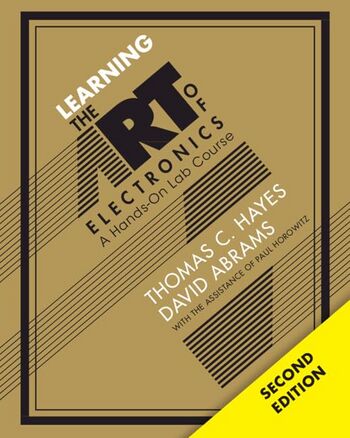
| Moniker: | LAoE |
| Title: | Learning The Art of Electronics: A Hands-On Lab Course 2nd Edition |
| Authors: | Thomas C. Hayes, David Abrams, Paul Horowitz |
| Published: | April 3, 2025 |
| Website: | learningtheartofelectronics.com |
| Links Website: | laoe.link |
| Teardown: | New Book Teardown #3: Learning The Art of Electronics: A Hands-On Lab Course (2016) |
| Library: | N/A |
| Buy at Amazon: | Amazon US, Amazon UK, Amazon CA, Amazon AU |
| Book notes: | Learning the Art of Electronics 2ed (subscriber-only content) |
The Art of Electronics 3ed
This is the definitive electronics reference work and the textbook for the course. Low to moderate levels of math.
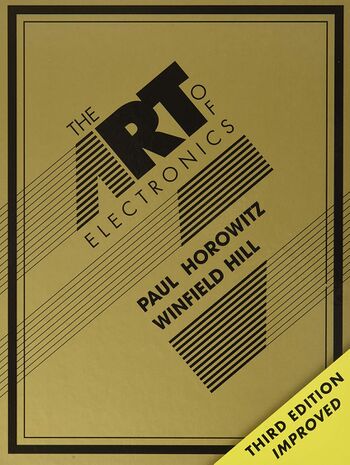
| Moniker: | AoE |
| Title: | The Art of Electronics 3rd Edition |
| Authors: | Paul Horowitz, Winfield Hill |
| Published: | March 30, 2015 |
| Website: | artofelectronics.net |
| Teardown: | New Book Teardown #1: The Art of Electronics 3rd Edition (2015) |
| Library: | archive.org |
| Buy at Amazon: | Amazon US, Amazon UK, Amazon CA, Amazon AU |
| Book notes: | The Art of Electronics 3ed (subscriber-only content) |
The Art of Electronics: The x Chapters
This is extra specialized material that didn't fit in The Art of Electronics 3ed. Low to moderate levels of math.
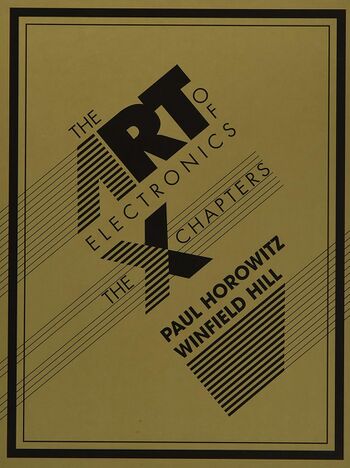
| Moniker: | AoEx |
| Title: | The Art of Electronics: The x Chapters |
| Authors: | Paul Horowitz, Winfield Hill |
| Published: | January 30, 2020 |
| Website: | x.artofelectronics.net |
| Teardown: | New Book Teardown #2: The Art of Electronics: The x-Chapters (2020) |
| Library: | N/A |
| Buy at Amazon: | Amazon US, Amazon UK, Amazon CA, Amazon AU |
| Book notes: | The Art of Electronics: The x Chapters (subscriber-only content) |
Principles of Electronic Circuits 2ed
This book covers semiconductor technology and integrated circuits. Heaps of math.
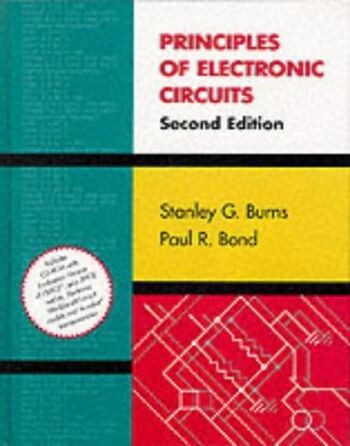
| Moniker: | PoEC |
| Title: | Principles of Electronic Circuits 2nd Edition |
| Authors: | Stanley G. Burns, Paul R. Bond |
| Published: | June 10, 1996 |
| Website: | N/A |
| Teardown: | Old Book Teardown #12: Principles of Electronic Circuits 2nd Edition (1997) |
| Library: | archive.org |
| Buy at Amazon: | Amazon US, Amazon UK, Amazon CA, Amazon AU |
| Book notes: | Principles of Electronic Circuits 2ed (subscriber-only content) |
Electricity and Magnetism 3ed
This book is about the physics of electricity and magnetism. Heaps of math.
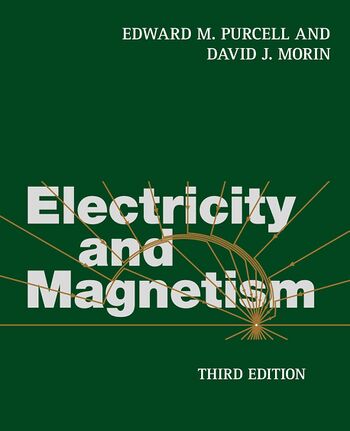
| Moniker: | E&M |
| Title: | Electricity and Magnetism 3rd Edition |
| Authors: | Edward M. Purcell, David J. Morin |
| Published: | March 14, 2013 |
| Website: | N/A |
| Teardown: | N/A |
| Library: | archive.org |
| Buy at Amazon: | Amazon US, Amazon UK, Amazon CA, Amazon AU |
| Book notes: | Electricity and Magnetism 3ed (subscriber-only content) |
Equipment
Here are some notes about equipment you might like to get (or similar) in order to work through the exercises. This list is not yet complete, I will add to it as we go through the material. Not everything is strictly required, these are just suggestions. If you have any questions or suggestions please let me know
Basic equipment
This is base-line equipment you should have.
| Equipment | Quantity | The One(s) I Have | Note |
|---|---|---|---|
| 30-volt capable bench supply | 1x dual-supply | Tenma 72-10505 Bench Power Supply | I also have two Riden RD6006 but they only do up to 19V |
| Variable Resistor / Decade Box | 2x each | Multicomp Pro MP701033 Resistor Box | I also have Yum Cha J15026-2 6-Knob Decade Resistor Box but they only go up to 10k |
| Digital Multimeter | 2x each | EEVblog BM2257 Digital Multimeter, Fluke 17B+ Digital Multimeter | it's good to have two (or more!); different kinds is good, but same kind is okay. If you're on a budget see Yum Cha DT830B Digital Multimeter. |
| Analog Multimeter | 1x each | Pro'sKit MT-2207-C Analog VOM Handheld Multimeter | you can skip this if you're not interested in old tech |
| Banana Cable | 10x each | Banana Cable | |
| Banana-to-Female | 1x 10-pack | Banana-to-Female | |
| Banana-to-Male | 1x 10-pack | Banana-to-Male | |
| DuPont Wire | 1x 120-pack | 120-Piece Dupont Wire | mix of female-female, female-male, male-male |
| Breadboard | at least one | MB102 Breadboards Kit | recommend 5 set for five of each: 5x 830 Point and 5x 400 Point |
| Breadboard Wire | 840pcs | Solderless Breadboard Jumper Wire | |
| Notebook | 1x notebook | Spirax 570 A5 SRT Note Book | |
| Pencil | 1x black set-B | Carpenter Mechanical Pencil | |
| Eraser | 1x two-pack | Staedtler Mars Plastic Eraser | |
| Calculator | optional | Sharp EL-546L Scientific Calculator | you can always use a software calculator |
| Precision Tweezers | 1x five-pack | Hakko CHP 3C-SA Precision Tweezers | you should have at least two, I got a five-pack |
| Wire Cutter | 1x five-pack | Plato Model 170 Wire Cutter | these are so handy I keep one or two on every bench! |
Soldering equipment
Note: you only need to get this equipment if you're planning to make permanent versions of the circuits. An alternative is to make breadboard circuits in which case you don't need this equipment.
| Equipment | Quantity | The One(s) I Have | Note |
|---|---|---|---|
| Soldering Iron | 1x each | Metcal PS-900 Soldering Station | |
| Hot Air Gun | 1x each | Horusdy Soldering Station | |
| Solderable Breadboard | 1x 50-pack | ElectroCookie Breadboard | get something like this if you want to solder together permanent circuits |
| 2Pin JST PH 2.0 Pitch Male | 100pcs | 2Pin JST PH 2.0 Pitch Male | Color: JST 2.0MM Male plug; for permanent circuit power if you're doing that |
| 2Pin JST PH 2.0 Pitch Female | 100pcs | 2Pin JST PH 2.0 Pitch Female | Color: JST 2.0MM 20CM; for permanent circuit power if you're doing that |
| Resistor Set | 16x 50pcs | 1W resistors | I got 1W but 1/4W would be okay too, I have: 10R, 100R, 470R, 1k, 2.2k, 4.7k, 5.1k, 10k, 15k, 20k, 22k, 47k, 51k, 100k, 1M, 10M (1/4W) |
